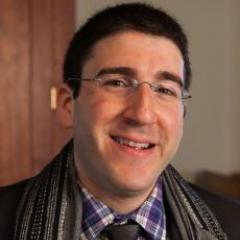
Volunteer of the Month: Jason Kaufman
Cantor Jason Kaufman received cantorial ordination and a Masters in Sacred Music from the Debbie Friedman School of Sacred Music at Hebrew Union College – Jewish Institute of religion (HUC-JIR) in 2010. He serves Beth El Hebrew Congregation in Alexandria, Virginia
In what capacity have you volunteered for the ACC and how has volunteerism shaped your work?
I presently serve as the co-chair for the ACC Social Action and Justice Committee and am one of two representatives from the ACC on the URJ Commission on Social Action. Since joining the Commission, I have served on the Domestic Policy Committee, the Religious Freedom Restoration Act Advisory Committee, and the Nominating Committee. I have also co-officiated the LGBT Pride Shabbat morning service hosted by the Religious Action Center of Reform Judaism, before the start of the DC Pride Parade -- I look forward to doing so again in just a few short weeks.
Since ordination in 2010, I have written articles for "Notes Worth Knowing" and "Koleinu."
What’s the best part about being a Cantor?
Before I became a Cantor, I think I would have said that the best part of being a Cantor would be the ability to surround myself with Jewish music and to lead services on a weekly basis. While this remains true, since my ordination I have realized that truly best part of being a Cantor is being welcomed into the lives of those we serve. I enjoy the opportunities to speak with students and congregants of all ages, to learn about who they are, what they are passionate about, and how they want to engage with the Jewish community. Mostly though, there is nothing more special than walking past the synagogue preschool and hearing a student shout from their classroom "Hey, there's the Shabbat Man!"
What is the most serious problem facing the cantorate presently and in the future?
We all know that the role of the cantor has changed dramatically since its inception. For many of us, the role of the Cantor has changed since we graduated from HUC-JIR. Furthermore, each Cantorial position can be quite unique, depending upon the culture of our congregations. This can be challenging, both for us as individuals and for our congregations. It means that we must be prepared to take on a wide range of roles within the synagogue. This can feel like a daunting responsibility, but it also provides us with the opportunity to provide a vision for what each of us can bring to our congregations as well as create a Cantorate that most closely aligns with our passions. For some of us, that may mean serving as an educator and leader of the synagogue’s B'nei Mitzvah program. For others, it may mean focusing on performing and traveling the country offering concerts. Some of us are composers, creating music for the next generation. Some spend significant time helping to heal individuals and communities, through meaningful pastoral work. Personally, I have found great meaning, along with other roles, engaging in the work of social justice, advocacy and community organizing. I am most proud when I spend time working with our youth on B'nei Mitzvah "Mitzvah projects" and bringing our Confirmation kids to lobby on Capitol Hill with the RAC's "L'Taken" program.
What influenced and/or motivated you to become a Cantor?
I grew up in Monsey, NY, where Judaism (especially Orthodoxy) surrounded me. While I was involved with my home synagogue, Temple Beth El in Spring Valley, New York, it wasn't until I went to a college at SUNY Fredonia, a school with a very small Jewish population that I recognized how important my Jewish identity was to me.
In college, I became very active in the Jewish Student Union/Hillel where I served as its President. As a voice major, numerous professors encouraged me to think about becoming a Cantor. I am most grateful to my college professors Julie Newell and Dr. Theodore Steinberg, who worked endlessly with me, supporting and encouraging me to apply to cantorial school. Without their encouragement, I'm not sure I ever would have applied to HUC-JIR.
What is one thing you’d like to tell us about yourself, that we might not know about you?
I am a four-time marathoner. To my surprise, running has become an important spiritual experience for me. Running has also become a conduit to bringing physical fitness and new socializing opportunities to synagogue life. I have enjoyed creating running groups with congregants of all ages and abilities.

